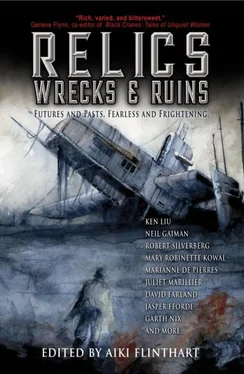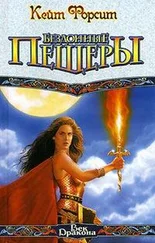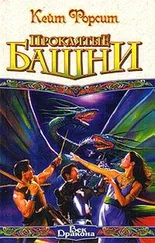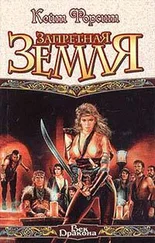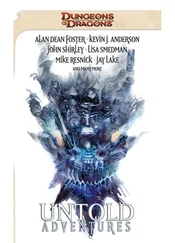You sign the agreement, and ask where she is.
“Where she’s always been, ten minutes north.”
You know this is unusual. Loops were designed never to overlap geographically or temporally. Intersections gave convicts potential areas of conflict with other prisoners. Quinn tells you to make it look like a chance meeting.
You drive out north on the same motorcycle you used to try and reach the bridge. It takes you until Loop 200,032 before you spot her, and she you. It’s not hard. Anything that is at variance to the rigidity of the timeline stands out like a flashing beacon. You drive past one another on the road, you both stamp on the brakes and then back up.
“Algy?” she says.
You say hello. She doesn’t look very happy. The gold heist was her gig, after all. You were just the muscle.
You find that the maximum amount of time you can spend together is one minute and nine seconds before you both get reset to the head of your loops. You tell her about Quinn’s deal straight away. She is not surprised.
“He asked to find out the same from you.”
She says she doesn’t know where the gold is but you know that, because you’ve known where the gold was all along. All seventeen tons of it, lying in the open on the edge of a bay that fifteen thousand years later, will be in the Derry peninsula. It’s still there, in the back garden of Mr. and Mrs. Tyrone, under eight feet of accreted soil and peat. They have barbecues over it, with their friends.
Over the next three hundred loops, you try and rebuild your relationship with Kitty, but all she wants to know is about the gold. You come to realize there was never a relationship. You think you might tell her, but you don’t. There’s nothing to be gained from it.
“You’re not going to tell me, are you?” she says finally.
“No.”
You don’t meet her again. You turn back to the waitress in the burger joint. She has a delightful gurgle of a laugh. You find yourself in love.
Quinn returns at Loop 260,000. You tell him Kitty doesn’t know where the gold is, or if she does, she’s not telling.
“You’re both a bunch of time wasters,” says Quinn, apparently not realizing the irony of his words. “Enjoy your time.”
You go back to your sixteen-minutes loops, over and over again. Another year’s worth of sixteens go by. It’s never the time, it’s the repetition . There is not a book you haven’t read, not a person you haven’t spoken to. You’ve been served by the waitress over a hundred thousand times, and when Quinn reappears at Loop 320,000, you do the deal, but for a full pardon. You are one third of the way through your sentence. To be the eighteenth richest person on the planet, you thought you could last out.
“Everyone comes to their senses eventually,” says Quinn. “If the gold is where you say it is, it’ll be time served.”
It is your final loop, the only one that will have any lasting consequence upon the townsfolk around you. Pointlessly, you say your goodbyes to people who have met you only a few minutes before. To them it’s just plain weird, but to you it means more than you know how to express. The man in the corner store who was always cheery, the busker who played the accordion in the main square. Most of all, the waitress. You feel emotional speaking to her. You make her laugh again and hand her your address on a scrap of paper.
“O-kay,” she says, somewhat uneasily.
You have a speech, and it’s a good one because you’ve had ten years to write it. She stares at you as you speak and raises an eyebrow. You know that no one has ever understood her so well, no one has ever encapsulated what she needs in words of such poetry and power. You know she’ll remember you.
But it’s not to meet in the 1990s. It’s to meet you back here in twelve years, if she wants. It’s a long shot, but she finds you intriguing rather than creepy, which is a good sign.
And that’s where you are now, in a much-changed market town, the shop fronts modernized, the clothes different, shoppers clutching smart phones, going about their business. You’ve been out for a couple of days. You don’t have a job and you don’t have much money. But you have liberty, and the sixteen minutes you’ve just witnessed has faded without ceremony into the past.
There have been 8,356 different sixteen minutes since your release. It’s a hard habit to break. You’ll be counting your sixteens for at least another six months. You glance at your watch and wonder if she will turn up, always supposing things didn’t work out for her. You hope they did, of course, because she was a good person, and deserves a good life.
You’re still waiting.

American Changeling
By Mary Robinette Kowal
Half-consciously, Kim put a hand up to cover her new nose ring. It pissed her parents off no end that she could tolerate touching cold iron and they couldn’t.
Iron still made her break out sometimes, but didn’t burn her. It had taken forever to find someone to make an iron nose ring, but the effort would be totally worth it.
“Kimberly Anne Smith.” Mom’s voice caught her in the foyer as surely as if she’d been called by her true name. “I’ve been worried sick. Do you know what time it is?”
“11:49.” Kim dropped her hand and turned to face Mom, her Doc Martens making a satisfactory clomping on the hardwood floor. “I’m here. Home before midnight. No one with me.” Sometimes she thought about bringing friends home to show them what her parents really looked like after their glamour dropped.
Everyone thought Mom was so pretty, so Betty Crocker, and Dad was all Jimmy Stewart. Whatever. Maybe if people saw that her parents were freaks like her they wouldn’t look at her with such pity.
“I specifically asked you to come home straight after school, young lady. I tried calling your cell, I don’t know how many times. You have no idea how worried I’ve been.”
“I was hanging out with Julia and Eve on Hawthorne.”
Mom took a step closer, wearing pearls, even at home. “What’s that in your nose?”
Kim blew her dyed-pink hair out of her face. “It’s called a nose ring.” Having people stare at her for the piercings and hair and leather was way better than having them stare at her because she looked prematurely old, like a progeria victim.
From the den, her father called, “Is she home?” A piece of ice clinked against glass. She so did not want to deal with Dad if he’d been drinking. He got maudlin about the old country and if she had to hear one more story about how life was so much better in Faerie, she’d scream.
“Yes!” Kim shouted. “I’m home and I’m going to bed so I don’t have to look at myself.”
She ran up the stairs two at a time, Utilikilt swinging against her legs. Mom hollered up the stairs at her, but Kim didn’t care. She hopped over the salt line on her threshold, slammed the door to her room and threw herself on the bed without even bothering to turn on the lights. What was the point?
The mantel clock downstairs chimed midnight.
Kim’s mom knocked on her door. “Kim? Come out, honey, your father and I need to talk to you.”
“Why don’t you come in?”
“If you’ll sweep the salt aside.”
Rolling her eyes, Kim dragged herself off the bed and opened the door. With midnight, the glamour masking her mother’s appearance had dropped. Mom had shrunk and twisted, aging one hundred years in the stroke of the clock. Gone was her carefully coiffed platinum hairdo in exchange for sparse, dry hair. The hall light gleamed off her scalp. Her nose nearly touched her chin, where a wart sported more hair than was on the rest of her head.
Читать дальше
